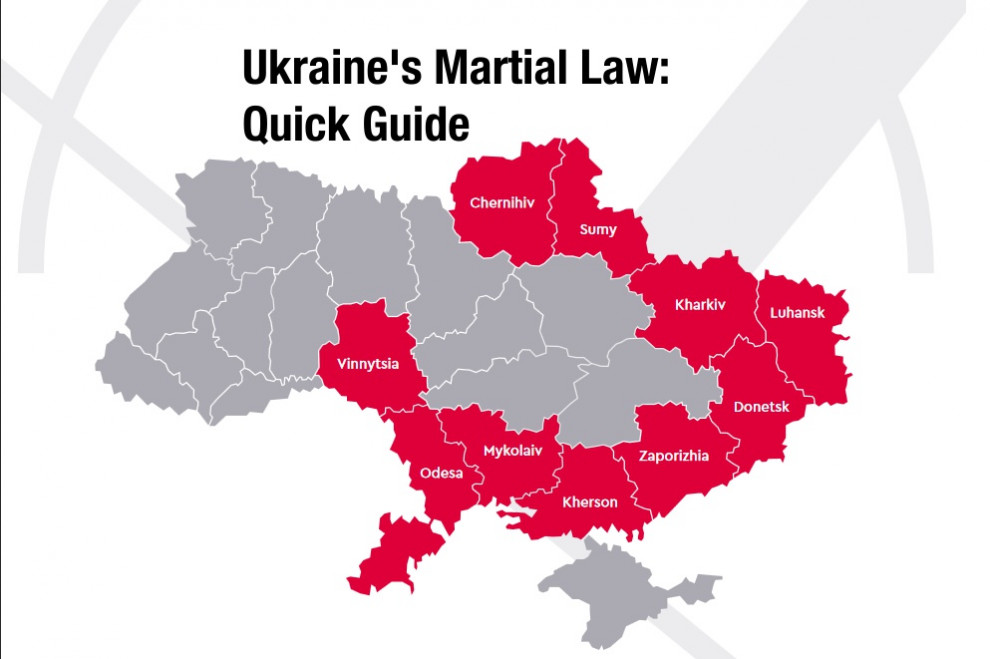On 26 November 2018, the President of Ukraine issued the decree (published on 28 November 2018 as supported by the Parliament) to introduce martial law in 10 regions of Ukraine for a 30-day period until 26 December 2018.
Essentials
- Introduced for the first time in Ukraine’s history.
- Lasts 30 days: from 26 November 2018 to 26 December 2018.
- 10 regions covered (Chernihiv, Donetsk, Kharkiv, Kherson, Luhansk, Mykolaiv, Odesa, Sumy, Vinnytsia, Zaporizhia) as well as the maritime zone close to the Kerch Strait and the Azov Sea – see the map.
- Companies having operations, property or counterparties in these regions are potentially affected.
- No exact measures or specific restrictions have been introduced. We expect the Government and other state bodies to develop implementing regulations shortly.
- The President declared his intension to introduce restrictions affecting rights and freedoms of people only in case of active Russian military operation in the country, beyond the currently occupied territories.
- The martial law does not appear to have an immediate impact on the ordinary course of business in Ukraine.
What Is Martial Law?
Martial law is a special legal regime imposed during periods of heightened military threat that gives state and military bodies additional powers and imposes restrictions on constitutional rights and freedoms for a certain period. Martial law has never been enacted in Ukraine before.
Therefore, there is no specific guidance at the moment on how it will be implemented in practice.
According to President Poroshenko, he would act under the martial law regime “only in the event of a land operation of the Russian regular army beyond occupied Crimea or the United Forces Operation area” (i.e. regions of military conflict in the Eastern Ukraine). The President said that "if we manage to avoid such scenario, the rights and freedoms of Ukrainian citizens will not be restricted". While this qualification is not clearly stated in the President's decree or in the Parliament's law approving the decree, it should be regarded as a political obligation undertaken by the head of state.
Implications
Several state authorities and organizations have made "keep calm" statements in connection with the situation:
- The National Bank of Ukraine “sees no threats to the uninterrupted operation of the banking sector if martial law is declared,” said the NBU Governor as cited by the NBU official website.
- According to the Ministry of Economic Development and Trade, martial law currently does not impose restrictions on economic activity "in whole territory of Ukraine". "Business entities and individuals may carry out economic operations as normal," a statement on the ministry's official website says.
- The Supreme Court informed that justice "will continue to be delivered by regular courts established according to the Constitution of Ukraine".
- The IMF representative in Ukraine told media that the Fund "has no legal restrictions regarding the continuation of cooperation with Ukraine".
Special Industry Regulation
Special regulations or restrictions may be imposed in the following areas/industries:
- critical national economy projects;
- defence;
- arms trade;
- trade in chemical and poisonous substances;
- trade in alcohol and ethanol-based substances;
- pharmaceuticals;
- telecommunications, publishing and media;
- cultural organisations.
General Restrictions
Certain categories of rights and freedoms may be restricted under martial law, including property rights, free entrepreneurship, free speech, labour and social rights, and free movement rights. As a result, the state may be authorized to undertake the following measures:
- use company assets and facilities and engage a company’s employees for defence purposes;
- enact labour duty for individuals for defence or other relevant social work;
- force a company to dispose of its property in the interests of state (compensation is guaranteed);
- restrict free movement and travel;
- conduct ID checks and inspection of personal items, luggage, vehicles, offices and houses;
- introduce curfew;
- force relocation of citizens of the aggressor state;
- prohibit peaceful gatherings, marches and rallies.
Risk Management
Martial law generally provides that if a company fails to comply with martial law, the state may:
- replace the company’s management;
- cease the company’s telecommunication, video/audio equipment and computers.
In this regard, companies and their owners should:
- make top management and other employees aware of the requirements of martial law, and
- put martial law compliance policies in place to monitor and prevent such non-compliance.
Areas for monitoring
1. Company’s Assets
The martial law regime provides for the possibility of the forced sale of a company’s assets. In this regard, to prevent fraud/abuse the management shall be briefed of the respective asset forced sale requirements, including which state body may force such a sale, on what grounds, and how to properly document the transfer of assets.
2. Travel
Travelling into the territories covered by martial law could be a subject to specific restrictions. In such traveling arrangements, we recommend the travellers to carry personal identification and travel documents on them throughout the whole travel time and checking on any additional registration or other requirements imposed by local authorities prior to travelling. No such restrictions have been imposed yet. However, citizens of the Russian Federation are subject to increased scrutiny when crossing the border and are advised to carry additional paperwork properly documenting their business trip purpose or other reasons for travel.
3. Contracts
As especially important for M&A, capital markets, debt financing and trade, introduction of martial law may invoke force majeure or material adverse change or a similar clause in business contracts. The business and its owners should review their contracts to understand if any notification/disclosure is needed in connection with the
introduction of martial law and make sure it does not trigger any adverse provision, which may require obtaining a waiver.
4. Tax
Tax system is generally unaffected by martial law. There are no new taxes or changes to the current tax rates.
5. Sanctions
Ukraine may extend its list of sanctions against Russia, its companies and nationals.
6. International Trade
Foreign trade restrictions may be introduced by special legislation to accompany martial law (for example, import ban on certain Russian products). Furthermore, the duration of customs clearance procedure may be extended.
7. Internet and Cybersecurity
Access to the Internet should not be limited. However, martial law decree generally refers to the need of ensuring information and cyber security. Therefore, some ad hoc and targeted Internet restrictions, including access to certain online resources, may be expected where it relates to national security and territorial integrity. Monitoring of communication traffic and temporary disconnection of selected networks is also possible.
8. Mobilization
Martial law authorizes the President to declare partial mobilization if necessary. Companies should check if their employees might be affected. To ensure continuity of company's operations, it is advisable to develop a workforce restructuring plan in case some of its employees are mobilized.






